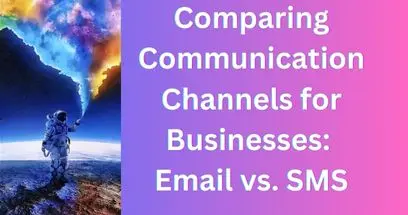Introduction Email vs. SMS
Effective communication is the lifeblood of businesses, ensuring seamless interactions with clients, customers, and partners. In today’s digital age, two prominent communication channels, email and SMS, vie for attention. This article aims to delve into a comprehensive comparison of email and SMS for business communication, shedding light on their distinct attributes and helping businesses make informed choices.

II. Email vs. SMS: A Comparison
A. Reach and Open Rates
In the realm of communication, reach and open rates are pivotal metrics. Email and SMS differ in their reach and open dynamics, influenced by factors like audience behavior and content relevance.
B. Cost Considerations
Navigating the financial landscape is crucial for businesses. This section breaks down the costs associated with email and SMS marketing, analyzing the impact of list size and message frequency.
C. Content and Targeting Capabilities
Content is king, and so is effective targeting. Here, we explore the content limitations of email and SMS, along with their targeting capabilities based on demographics and behavioral data.
D. Engagement and Response Rates
The success of communication channels relies on engagement and response rates. We compare these metrics for email and SMS, emphasizing the importance of measurement and analysis.
E. Time Sensitivity and Urgency
Time sensitivity is a key consideration in business communication. We evaluate the effectiveness of email and SMS in delivering time-sensitive messages and the consequences of choosing the wrong channel for urgent communication.
F. Integration Capabilities
Integration with other business systems is vital for efficiency. This section elaborates on the integration capabilities of email and SMS platforms, emphasizing the advantages of a unified communication approach.
III. Choosing the Right Channel: Factors to Consider
Selecting the optimal communication channel involves weighing several factors. From understanding the target audience to considering budget constraints, this section provides a comprehensive guide for businesses to make informed choices.
IV. Best Practices for Using Email and SMS
A. Email Best Practices
- Building and Segmenting Your Email List: Tailor communication to specific audience segments.
- Creating Clear and Compelling Subject Lines: Capture attention with concise and engaging subject lines.
- Optimizing Email Content for Mobile Devices: Ensure seamless viewing across devices.
- Personalizing Your Emails: Foster a personalized connection with your audience.
- Using Strong Calls to Action: Encourage desired actions with compelling CTAs.
- Measuring and Analyzing Email Performance: Utilize analytics to refine future strategies.
B. SMS Best Practices
- Obtaining Explicit Opt-In Consent: Respect privacy and gain permission for communication.
- Keeping Messages Concise and Relevant: Deliver focused messages for maximum impact.
- Using Clear and Simple Language: Ensure easy comprehension without ambiguity.
- Including a Strong Call to Action: Drive immediate response with clear CTAs.
- Scheduling Messages for Optimal Delivery Times: Time messages for maximum visibility.
- Measuring and Analyzing SMS Performance: Leverage data to enhance future campaigns.
V. Conclusion
In conclusion, the choice between email and SMS hinges on understanding their nuances and aligning them with specific business goals. A strategic approach, coupled with adherence to best practices, can amplify the effectiveness of these communication channels.
VI. Appendix
This section includes essential information like definitions of key terms, examples of successful email and SMS campaigns, and relevant industry trends and data.
For further exploration of email and SMS marketing, feel free to access additional resources to refine your communication strategies.
As the founder of Humbaa.com, my mission is to empower businesses with insightful information, enabling them to navigate the complex landscape of communication channels effectively.
Nikhil, Founder, Humbaa.com
1. Q: What sets SMS apart from email in terms of communication effectiveness?
A: SMS offers immediacy and higher open rates, making it ideal for urgent messages or time-sensitive information.
2. Q: How does the cost of SMS marketing compare to email marketing?
A: SMS marketing tends to be more cost-effective, with lower costs per message compared to email marketing. However, the overall cost can vary based on factors like message frequency and list size.
3. Q: Can businesses integrate both email and SMS into their communication strategy?
A: Absolutely. Many businesses find success in using a combination of email and SMS to reach a wider audience and cater to diverse communication preferences.
4. Q: What role does personalization play in the effectiveness of email campaigns?
A: Personalization in email campaigns fosters a stronger connection with the audience, increasing engagement and response rates.
5. Q: How can businesses optimize SMS content for maximum impact?
A: Keeping SMS messages concise, relevant, and including a clear call to action ensures optimal impact and encourages immediate responses from recipients.
6. Q: Is obtaining opt-in consent necessary for SMS marketing?
A: Yes, it’s crucial to obtain explicit opt-in consent from recipients before engaging in SMS marketing to respect privacy and adhere to regulatory requirements.
7. Q: Can businesses measure the success of their email campaigns beyond open and click rates?
A: Yes, businesses can delve deeper into email campaign performance by analyzing metrics such as conversion rates, bounce rates, and overall audience engagement.
8. Q: What factors influence the reach and open rates of email campaigns?
A: Factors like the relevance of content, subject line effectiveness, and audience segmentation play key roles in influencing the reach and open rates of email campaigns.
9. Q: How important is it for businesses to schedule SMS messages strategically?
A: Scheduling SMS messages at optimal times is crucial for visibility and response rates. Timing can significantly impact the success of SMS campaigns.
10. Q: Are there specific industries where SMS marketing tends to be more effective than email marketing?
A: Yes, industries requiring urgent communication, such as retail (for flash sales) and healthcare (for appointment reminders), often find SMS marketing to be exceptionally effective.
Feel free to use these FAQs to enhance your article or for any other informational purposes.
